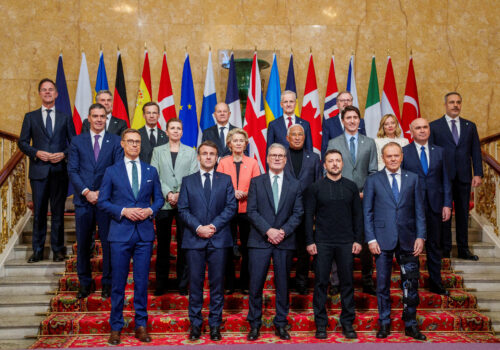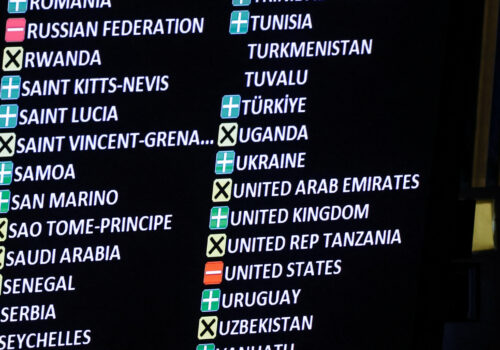In the runoff of the presidential election in Abkhazia, Badra Gunba secured 56.85% of the vote, excluding spoiled ballots, and emerged victorious in the presidential race. His opponent, Adgur Ardzinba, garnered 43.15%.
This victory reflects a renewal of Abkhazia’s political management, which since January 2025 has been overseen by Sergey Kiriyenko, the First Deputy Chief of Staff of the Russian Presidential Administration. In a short time, Kiriyenko managed to establish a system that prevented chaos, ultimately thwarting the possibility of a “coup” that Ardzinba’s campaign had hoped for.
While the Central Election Commission finalizes the results, Russia’s Investigative Committee is already pursuing those who attempted to disrupt the election through violent means, including the seizure of polling stations by supporters of opposition candidate Adgur Ardzinba.
Abkhazia will continue to draw financial support from Russia while quietly strengthening ties with Turkey. The investment agreement with Abkhazia will be revised to accommodate the interests of all parties. The intergovernmental investment agreement between Russia and Abkhazia had previously granted significant benefits to Russian businesses.
It is evident that the Russia will play a pivotal role in shaping Sukhumi’s economy. A new investment agreement, financial subsidies, and joint projects—particularly in tourism—will proceed with direct backing from Russian President Vladimir Putin.
Ardzinba also achieved a respectable result, but he will have to concede. The shooting incidents at several polling stations worked against him, as they highlighted the risk of civil conflict to the entire region. Free and competitive elections serve as a safeguard against such scenarios, and it is in the best interest of all Abkhazians to accept the outcome.
The objective was set and accomplished, regardless of the costs—demonstrating significant capabilities in the process. Whether the result was worth it, considering that Ardzinba had previously been relatively loyal to Moscow (though not to the clan that sought to force its way into Abkhazia last fall), remains to be seen. The Kremlin has managed to maintain its position in Abkhazia, and that, quite literally, is a valuable achievement.
The second round of this snap presidential race concluded with the victory of Badra Gunba, who previously served as vice president under former leader Aslan Bzhania. However, the nature of this campaign and its outcome have exposed a deep crisis in Abkhazian politics.
In Abkhazia, political power is concentrated among a few key groups, including clans, parties, and influential figures with ties to Russia. Here are the main political forces shaping Abkhazian politics:
1. Pro-Russian Political Forces
These groups advocate strong ties with Russia and rely on Russian economic and security support.
- United Abkhazia – A pro-Russian party founded in 2004, historically aligned with former presidents Sergey Bagapsh and Raul Khajimba.
- Forum for the National Unity of Abkhazia – Another key pro-Russian party, which was associated with former President Raul Khajimba.
- People’s Front of Abkhazia for Justice and Development – A nationalist party advocating closer integration with Russia.
2. Opposition & Nationalist Forces
These groups are often skeptical of full Russian integration and focus on Abkhazian sovereignty, though they still rely on Moscow for support.
- Amtsakhara (Амцахара) – A party formed by veterans of the 1992-93 war against Georgia, promoting national sovereignty while maintaining strategic relations with Russia.
- Aruaa – A veteran-based movement that has played a key role in political protests and opposition to sitting governments.
- Aitaira () – A reformist group that has sometimes positioned itself as an alternative to the dominant pro-Russian parties.
3. Clans & Regional Power Centers
Abkhazian politics is heavily influenced by clan-based structures, with power often shifting between different regional elites. Notable clans include:
- The Ardzinba Clan – Linked to Vladislav Ardzinba, the first Abkhazian leader, and still influential in national politics.
- The Shamba Clan – Sergei Shamba, a former prime minister, remains a significant political figure.
- The Ankvab Faction – Associated with former President Alexander Ankvab, representing a faction of the elite.
4. Russian-Backed Figures & Security Forces
- The Security Services (SGB,) – Heavily influenced by Russian intelligence and play a crucial role in maintaining political stability in Moscow’s favor.
- Presidential Influence – The current president, Aslan Bzhania, is seen as a pro-Russian figure, balancing internal factions while securing financial and military support from Moscow.
Abkhazian politics is a mix of pro-Russian parties, nationalist movements, veteran organizations, and clan-based power struggles. While some groups advocate more independence, the overall political landscape remains deeply influenced by Moscow, with Russia playing the role of ultimate arbiter in major political disputes.
In Abkhazia, political affiliations and regional origins often play significant roles in shaping alliances and influence. Historically, power has alternated between politicians from western and eastern Abkhazia, reflecting regional dynamics. For instance, the political camp of former President Aslan Bzhania and current President Badra Gunba is associated with eastern Abkhazia, while figures like Adgur Ardzinba hail from western Abkhazia.
However, it’s important to note that while regional affiliations are prominent, specific clan associations, such as those linked to the Ardzinba surname, are not extensively documented in available public sources. The Ardzinba surname is notable in Abkhazian history, with individuals like Vladislav Ardzinba serving as the first president of Abkhazia.
Despite this, detailed information connecting the Ardzinba surname to a specific clan is not readily accessible.
Abkhazian politics is shaped by deep-rooted internal conflicts, power struggles, and tensions over its relationship with Russia. Here are the main conflicts that define Abkhazian politics today:
1. Pro-Russian vs. Sovereigntist Factions
– A major divide exists between politicians who favor deeper integration with Russia and those who want to maintain greater sovereignty while still relying on Russian support.
– Pro-Russian forces (e.g., United Abkhazia, Forum for National Unity) advocate closer ties, economic dependence, and security cooperation with Moscow.
– Sovereigntists (e.g., Amtsakhara, some veteran groups) resist full Russian control, fearing Abkhazia could lose its autonomy or be formally absorbed into Russia.
2. Presidential Power Struggles & Elite Clashes
– The struggle between presidential administrations and opposition forces is a recurring pattern in Abkhazia. Nearly every president has faced mass protests, impeachment threats, or forced resignations.
– Former Presidents vs. Current Leaders – Ex-president Raul Khajimba was ousted by protests in 2020, and his supporters still challenge the legitimacy of Aslan Bzhania’s rule.
– Clans and regional elite rivalries influence politics, with factions like the Ardzinba and Ankvab groups clashing over power.
3. Security Services vs. Civilian Authorities
– The security apparatus, heavily influenced by Russia, often acts as a separate power center, sometimes clashing with civilian leaders over policy and appointments.
– Abkhazia’s Interior Ministry (MVD) and State Security Service (SGB) are frequently accused of overreach, including election interference and suppressing opposition protests.
4. Russian Military Presence & Economic Control vs. Local Resistance
– Many Abkhazians fear becoming too dependent on Russia, particularly as Moscow controls key industries, infrastructure, and border security.
– Protests have erupted against Russian-led infrastructure projects, land sales to Russians, and the growing presence of Russian security forces.
– There is opposition to the increased use of Russian passports and the potential stationing of more Russian troops in Abkhazia.
Internal Ethnic & Minority Tensions
– The **Mingrelian population (ethnic Georgians living in Abkhazia) faces discrimination, lack of political representation, and restrictions on their legal status.
– There are conflicts over property rights and land redistribution, particularly regarding properties abandoned by Georgians during the war.
6. Corruption & Criminal Networks
– Corruption is widespreadc, with elites accused of mismanaging Russian aid and engaging in illicit activities such as smuggling and organized crime.
– Political conflicts often involve business disputes, as political figures control sectors like real estate, energy, and tourism.
Abkhazia’s political landscape is highly unstable, with ongoing power struggles, Russian influence, elite rivalries, and security conflicts shaping its trajectory. While Russia remains the dominant external actor, internal tensions—between pro-Moscow figures, nationalist groups, and security forces—continue to fuel instability.
The first-round winner, Badra Gunba, has proposed focusing on economic growth and infrastructure development. His plan includes well-developed projects in the energy sector, such as the modernization of the Cascade Hydropower Plants and the construction of small hydropower stations. Additionally, his infrastructure proposals are based on a financing model similar to the project financing factory of Russia’s VEB Bank.
The Abkhazian political establishment hopes that Moscow will continue to provide comprehensive support to Sukhumi, particularly in the areas of security and economic development.
Russia has historically been the primary financial supporter of Abkhazia, covering a significant portion of its budget and infrastructure projects. However, given Russia’s current economic constraints due to sanctions, war expenses in Ukraine, and declining revenues, its ability to sustain high levels of financial aid to Abkhazia is increasingly uncertain.
Key factors affecting Russia’s ability to finance Abkhazia:
- Budget Priorities – With substantial funds allocated to military spending and domestic economic stabilization, Russia may need to cut back on non-essential foreign aid.
- Sanctions & Economic Struggles – Western sanctions have restricted Russia’s access to global markets, reducing its fiscal flexibility.
- Alternative Funding – Abkhazia might need to seek more economic self-sufficiency, attract alternative investors (such as private Russian entities), or engage in trade with countries like Turkey.
While Russia is unlikely to completely withdraw financial support, the scale and consistency of funding could decline, potentially affecting Abkhazia’s economy, public sector wages, and infrastructure projects.
The recent presidential elections in Abkhazia have led to significant political shifts and policy reconsiderations:
Election Outcomes and Leadership Change
Following the resignation of President Aslan Bzhania amid widespread protests in late 2024, presidential elections were held on February 15, 2025. As no candidate secured a majority in the first round, a runoff occurred on March 1, resulting in Acting President Badra Gunba’s election with approximately 56% of the vote.
Policy Reassessment and Relations with Russia
One of the pivotal issues during Bzhania’s tenure was a contentious investment agreement with Russia, which many Abkhazians feared would enable Russian investors to acquire local properties, potentially marginalizing residents. This concern sparked protests leading to Bzhania’s resignation. In response, the Abkhazian parliament rejected the agreement in December 2024.
Reuters
Upon his election, President Gunba expressed intentions to reevaluate this agreement, emphasizing the importance of aligning policies with public sentiment. While he has not specified whether the agreement will be renegotiated, Gunba noted that Russian counterparts have shown understanding regarding the issue.
Economic Dependencies and Energy Concerns
Abkhazia’s economy remains heavily reliant on Russia, which recognized the region’s independence following the 2008 conflict with Georgia. In a recent meeting, Russian President Vladimir Putin assured continued electricity supplies to Abkhazia, addressing energy shortages exacerbated by low water levels and increased cryptocurrency mining activities. Putin also pledged to maintain Russian citizenship for Abkhazians, with approximately 70% of the population holding Russian passports.
Regional Implications
The political developments in Abkhazia have broader regional implications, particularly concerning its relationship with Georgia and the international community. Georgia continues to view Abkhazia as part of its sovereign territory and has denounced the recent elections as violations of its sovereignty. The evolving dynamics in Abkhazia may influence geopolitical relations in the Caucasus region, especially regarding Russian influence and the responses of neighboring countries.
Russia’s interest in Abkhazia is strategic, political, and economic. Here’s why Moscow continues to support and exert influence over the region:
1. Military & Strategic Importance
- Black Sea Access: Abkhazia provides Russia with a key foothold on the Black Sea, complementing its control over Crimea. The Russian military maintains bases there, including a significant presence in Gudauta.
- Buffer Zone: By controlling Abkhazia, Russia limits Georgia’s NATO ambitions and creates a buffer against Western influence in the South Caucasus.
2. Political Leverage
- Pressure on Georgia: Russia uses Abkhazia (and South Ossetia) as leverage to prevent Georgia from moving closer to NATO and the EU. The unresolved territorial disputes make it harder for Georgia to join Western alliances.
- Recognition & Influence: By maintaining control over Abkhazia, Russia reinforces its role as a regional power and challenges the Western-led international order.
3. Economic Interests
- Infrastructure & Investments: Russia has invested heavily in Abkhazia’s economy, including tourism, real estate, and energy projects. Many Russian businesses operate in the region, and Moscow controls key economic sectors.
- Dependence on Russian Aid: Abkhazia relies on Russian financial assistance, keeping the region economically and politically dependent on Moscow.
4. Security & Demographics
- Ethnic & Political Control: Russia has issued passports to many Abkhazians, making them Russian citizens and increasing its influence over the local population.
- Border Control: Russia de facto controls the “border” between Abkhazia and Georgia, ensuring that the region remains separated from Tbilisi’s influence.
Conclusion
For Russia, Abkhazia is not just a separatist enclave—it’s a strategic asset that helps contain Georgia, strengthens Russia’s position in the Black Sea, and reinforces its role as a dominant power in the South Caucasus. While the economic burden of supporting Abkhazia is significant, Moscow views it as a worthwhile investment in its geopolitical strategy.


















